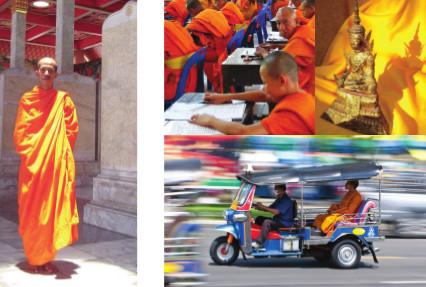
I have lived in Thailand since 1986 working with a Thai church movement. In a population of 62 million ethnic Thai, only .3 percent are Protestant Christians—a small minority surrounded by a Buddhist world.1 Consequently, the question at hand is the nature of the interaction between Buddhists and Christians.
The interface between Christians and Buddhists in daily life allows for various modes of interaction.2 Those who are Evangelical Christians desire to communicate in word and deed the good news of what God has done in Christ for us. Before I share some of my observations on the kinds of interactions I have observed in Christian-Buddhist relations, let me offer three brief caveats. First, my own experiences represent only a small slice of the diversity present in Buddhist-Christian relations. Second, my experience comes from the Pentecostal and Evangelical perspectives. Finally, my focus is on the interface of the everyday life of regular people rather than the Christian-Buddhist dialogue on the academic level.3
Antagonism
After nearly two hundred years of Protestant Christianity in Thailand, the Christian faith is still seen as a foreign religion.4 To be Thai is to be Buddhist, and those who turn to Christ are perceived as leaving the ancestral ways and adopting foreign ways. While actual violence is rare, there is unrelenting pressure on those who embrace the Christian faith to return to the fold. The deep-rooted nature of this feeling is hard for outsiders to grasp. A Thai pastor related to me that as he picked his son up from school one day, a group of second-grade boys surrounded them, asking if they were Christians. After the pastor affirmed this question, the boys responded that they couldn’t be Christians since they didn’t speak English.5 This experience for new converts of being marginalized, scrutinized, and having their “Thainess” challenged on a repeated basis forms the backdrop to relationships between Christians and their Buddhist relatives and neighbors.
Isolation
Antagonism means that for the new convert to Christianity there is not a lot of space for irenic discussion of doctrinal differences and religious philosophy. They are seen by the majority of Buddhists as sheep that need to be brought back into the fold. This societal pressure and antagonism creates a reaction that isolates Christians from the Buddhists. Even further, the original transmission of the faith required a complete separation from everything that had to do with Buddhism. Christians are perceived to break family unity by their refusal to participate in the vast ceremonial life that is part of folk Buddhism. Instead, the church becomes the focal point of a new set of social relations. Unfortunately, there has been too little exploration of creative ways to express love to family while abstaining from practices involving idols. Consequently, although cross-cultural workers learn about Buddhism to intelligently communicate with the Thai majority, Thai believers of the second generation and beyond often know nothing of Buddhism and see little reason for learning about it.
Sometimes accurate communication can completely change the dynamics of a relationship between a Buddhist and a Christian. A Thai pastor told me of a young man who was thrown out of his house for becoming a Christian. The pastor asked to speak with the mother, and finally she consented to call him. After he heard her concern that she believed Christians were told to reject their families, he talked about the biblical perspective of honoring one’s father and mother. After she heard that, she said that her son could attend church and live at home. Clarifying this misunderstanding solved a potentially giant family breach.
Unclear Message and Methods
Although research on conversion reveals that Thais respond to the gospel if they can see it lived out, assess the message, and experience its power, Christians are sometimes unclear regarding the message and its delivery.6 People often ask me—a foreigner—what I do, and I tell them I work with a foundation that was started by Thai Christians. I ask them if they have ever met a Thai Christian; if they have, I will ask them whether a Thai Christian has ever shared their faith with them. I have been surprised how often the answer is no. Some have told me that friends said they to go church and learn, while other were given the impression that Christianity is the same as Buddhism in terms of trying to be good and make merit.
Compounding the problem of an unclear message are problematic methods. Nantachai Mejudhon did research for his doctoral dissertation on how Thai Christians share the gospel and found that Thai believers emulated the practices of westerners in the way they shared the gospel: aggressive, confrontational, nonrelational, and propositional methods are not appreciated by Thais.7 One of Nantachai’s questions to Buddhist interviewees was, “What way of presenting the gospel would most appeal to Buddhists?” The answer was very revealing:
Buddhists mentioned that Christians should demonstrate the gospel in such a way that Buddhists experience the power of quietness and peace in their hearts. A Buddhist said, “If the gospel helped Buddhists to gain what they seek in Buddhism, it would be communicable and reasonable. Buddhists seek an escape from suffering, quiet minds, and Kham Loom Yen (cooled shade of life), happiness.”8
The average Thai Buddhist is focused on concrete here-and-now experience rather than future-oriented ultimates like escaping suffering by extinguishing desire and achieving nirvana.
Talking Past Each Other
I have noticed how both Christians and Buddhists tend to miss each other by interpreting the other through their own worldview lens. In the Christian faith, we emphasize orthodoxy (right beliefs), but in Buddhism it is orthopraxy that matters (right behavior). Christians often share their faith by telling people what to believe, while the Buddhist listener is more concerned with the question, “What do I have to do to enter Christianity?” Christians tend to look at their Buddhist neighbors through the lens of orthodoxy and see them not going to temple, not meditating, not reading their Scriptures, and wrongly assume that “they are not good Buddhists.” On the other hand, Buddhists will look at the good lives of their Christian friends and assume that they are making merit and endeavoring to increase the chances of having a better life the next time around. When this occurs Buddhists and Christians talk past each other and fail to communicate their faith clearly.
When Christians Touch the Buddhist Heart—Finding Thai Ways of Following Jesus
Although sometimes interface results in an obscured transmission of the message, other practices can make a deep impact on Buddhist family and friends, leading many to seriously consider the claims of Jesus Christ. These are the things that are causing the Thai church to grow at a rate of 4.2 percent per year.9
I have found that new Christian converts were usually impacted by something they saw in the life of a Christian—a uniquely different way of living and relating to each other and outsiders. Christians loving and serving others without seeking personal benefit causes Buddhists to take notice. We hear of many becoming Christians in areas hit by the tsunami back in 2004 because it was Christians who came and helped in the rebuilding after the crisis.
Thai Christians will share their own stories of what happened when they met Jesus and prayed for their friends; when people experience distinct answers to prayers directed to Jesus they often begin to want to learn more about him. Thai Christians invite their Buddhist friends and family to experience God’s family in small groups or church services. Many people find a sense of family they have never experienced and “belong” to this new community before they actually begin to “believe.”
An increasing number of people, both cross-cultural workers and local Thai believers, are exploring Thai ways of following Christ. Through music, developing ceremonies that communicate biblical truth in the Thai context, and other approaches, people are attempting to remove the association with foreignness that prevents many Thai Buddhists from considering a relationship with Jesus.


